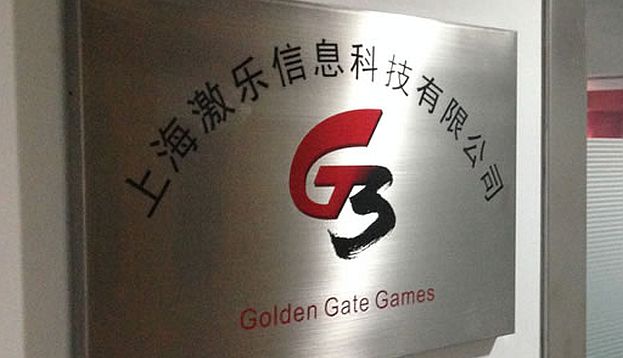The massive growth of mobile games is a phenomenon that’s occurring all over the globe, but nowhere faster than in China. Smartphone adoption is growing by double-digit rates, and the market is measured in hundreds of millions of smartphones and billions of dollars. Yet with all this rapid growth, Western game publishers haven’t had much success in bringing mobile games to the Chinese market. The Chinese app charts are dominated by Chinese mobile games, despite the large numbers of games developed elsewhere in the world that have generated devoted audiences.
This seems like a tremendous opportunity, and Golden Gate Games was formed precisely in order to take advantage of it. The company, founded by game industry veterans Keith McCurdy and David Zhu, helps developers and publishers bring games to China. “Working in China can be a challenge for all but the largest companies in the gaming industry,” Golden Gate Games’ web site proclaims. “With G3’s local knowledge, Shanghai game development studio, corporate and financial cross border structure, publishing team, and distribution connections, we can culturalize your game for the China market and publish it via a wide array of app stores and mobile operator channels.”
Golden Gate Games has already taken several games into China since its founding in February of this year, and more are on the way. The [a]listdaily spoke with co-founder Keith McCurdy about the company’s efforts to help Western developers gain a place in the vast Chinese market.
 Keith McCurdy
Keith McCurdy
[a]listdaily: What’s the state of the Chinese market for mobile games
Keith McCurdy: The market is exploding. It doubled in the last two years each year, some say more than doubled last year. It’s probably going to double again in 2014. It’s on a hyper-growth trajectory, and there’s lots of new smartphones being sold in China. There are 400 million new Android phones this year and another 400 million Android phones next year. That’s almost a billion empty Andropid phones. While some of them are low cost, they are still high quality. They’re dual core, big-screen phones that can play the type of games that 80-90 percent of the mobile gaming market covers just fine.
It’s a huge and growing market, and they do like Western content. In the top ten games, five of them are Western games, things like Plants Vs. Zombies and Subway Surfers. There’s a huge, fast-growing market, and there’s a proven appetite for Western content. There’s just a couple of things missing in the equation. One, it’s very difficult for Westerners to deal with China, culturally, legally, product-development-wise, publishing, and otherwise. It’s also very difficult when you make money in China to bring it back to the West. It’s very hard to know what to do with your games; you can’t just localize by changing the language, publish it in China and expect to make money.
[a]listdaily: What is it that you have to do to mobile games for the Chinese market
Keith McCurdy: All the games that are making money in China are heavily culturalized. By culturalization we mean not just changing the language, but changing the some of the content — the graphics, the style, the user interface, the monetization mechanics, sometimes the difficulty level because Chinese like things different. There’s a lot of work to be done. Two years ago people thought it was a lot like porting. What David and I have found is it’s more like product development work, You have to really come to the table with a plan to take a Western game and change it in a way that will make money in China. There’s the fundamental bones of the game that will make money, but the outer-facing stuff will need to be adjusted in a very conscientious way to apply to the Chinese market. Stuff like changing what you sell, or how often you sell it, or how aggressively you push it, or changing the way the main character looks, or how you navigate the user interface. These are all easy things to do once you have a good game that’s accessible, but they take know-how in country — Chinese designers, programmers, artists — and you have to do it specifically for that market.
 Romans from Mars
Romans from Mars
[a]listdaily: What are the biggest changes you see headed to the market in China
Keith McCurdy: There’s growth and what’s driving it, just the massive number of new handsets and new users, and and people upgrading from feature phones and to better smartphones. The other growth drivers is the move to 4G quality networks. China is really expanding that quickly, which is allowing people to download bigger apps, do more connected stuff, more video streaming, and stuff like that. Those are the growth drivers.
The other big change in China is around billing. Right now a lot of the billing in mobile gaming in China goes through the carriers. Even if you download a game from, say, the Baidu app store (which is one of the largest), you still have to pay for stuff. If you’re, say, a China Mobile subscriber (which is like being a Verizon subscriber) you can buy stuff in the game by using SMS billing, where it shows up on your phone. They charge a lot for that — they charge 30 percent for that billing. But there are a lot of people like AliPay and WeChat Pay and other systems that are integrated that are lowering that charge for billing to the publisher down to 10 percent or lower. That’s a huge bonus for us content guys that make games. Instead of paying 30 percent to collect revenue, you’re paying 5 percent to 10 percent.
That will make some channels and some games and some customers much more profitable on a percentage basis than even the West, where we pay 30 percent across the board. That whole transition is a big open thing — similar to the way app stores are fragmented, billing is fragmented.
[a]listdaily: How do you see publishers approaching the Chinese market
Keith McCurdy: I’ve talked to a lot of guys at some of the bigger publishers, and they all say ‘we want to work in China because we feel it’s a precursor of what’s going to happen in the West.’ This is an example of that. In China, the deep integration, the community, the sharing, that’s what drives all the revenue. We’re seeing that in the West now, but I think it started in China a year and a half ago. People in the West look to China and Asia in general to see the future of free-to-play, online gaming, and mobile gaming.
What’s going on with WeChat, Line, Kakao, is important. If you’re familiar with Xiaomi, they’re like the Apple of China. [Xiaomi is a rapidly growing smartphone maker with phones reminiscent of Apple — Ed.] Xiaomi is creating its own instant messaging social network and gaming is a big part of it. There’s a lot of stuff going on in Asia, and I think Western publishers look at it and say “We need to be doing stuff there and learning from there, because they are figuring out stuff at a faster pace than we are in the West.”

